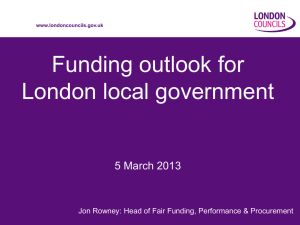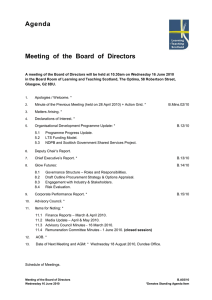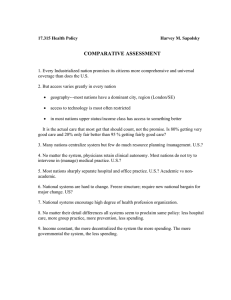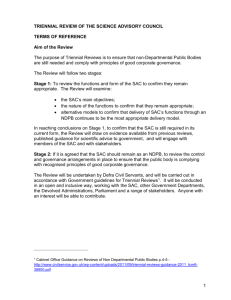Total Place: London’s public spending Urban & Regional Economics Lent Term Seminars
advertisement
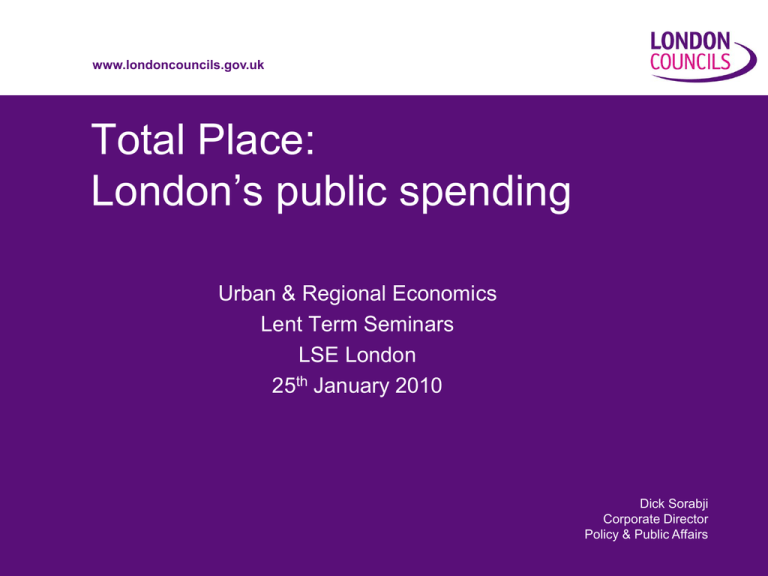
www.londoncouncils.gov.uk Total Place: London’s public spending Urban & Regional Economics Lent Term Seminars LSE London 25th January 2010 Dick Sorabji Corporate Director Policy & Public Affairs www.londoncouncils.gov.uk What is Total Place? • CLG sponsored pilots – HMT & Cabinet Office support – 13 pilots – April 2009 to April 2010 • A whole area approach • Doing better with less • 70~ informal pilots – Individual authorities – London mapping • Strands – Counting – Culture – Customer insight Trying to go beyond SRB, LAA and MAA www.londoncouncils.gov.uk Total Places: what & where Total Places Policy Themes 1. 2. 3. 4. 5. 6. 7. 8. 9. 10. 11. • • • • • • Birmingham Bradford Coventry, Solihull, Warwickshire Croydon Dorset, Poole, Bournemouth Durham Kent Leicester & Leicestershire Lewisham Luton & Central Bedfordshire Manchester city region & Warrington 12. South Tyneside, Gateshead, Sunderland 13. Worcestershire Alcohol & drugs Health & social care Children Crime High cost communities Young people & employment Targeting wicked problems in diverse communities www.londoncouncils.gov.uk Total Place : in its place • Technology & public services • Streamline central government – Senior Civil Service – Sharper delivery • Government efficiency – Including re-location • Total Place & Performance – Central local frameworks Competing to be a priority in government response to public finance pressures www.londoncouncils.gov.uk Total Place: drivers & destinations • • • Driven by: – Weaknesses in silo delivery – Public finance squeeze Method: – Looks at all public service in a place – Identifies overlap and duplication – Redesigns to improve service & efficiency Goals: – Operational outcomes • Service transformation plans • Early efficiencies • Understanding multi-organisation delivery – Strategic outcomes • Creating incentives to innovate locally • Changing central government Total Place is a theory as well as a national initiative www.londoncouncils.gov.uk London Councils’ local audit: PwC thinking with numbers • New perspectives – By policy area – By organisational crowding • Deeper investigation – Managing chronic care – Obstacles to work – Whole system approach to youth offending • Different focus to Total Place pilots – Central government reform – Local solutions to national problems • Organisational evidence for London policy proposals Focusing on the conditions for success more any one success www.londoncouncils.gov.uk Total State spending in London www.londoncouncils.gov.uk London locally managed spending www.londoncouncils.gov.uk London public spending 2008/09 £millions National NDPBs Local Total % 5 0 10 15 0 Recreation 365 100 710 1170 2 General 290 10 980 1280 2 Housing + 120 1190 1840 3150 4 Environment 210 80 870 1160 2 Economic 2310 840 4520 7670 10 Public order 2160 300 3930 6390 9 Education 2380 2520 7550 12450 17 Health 7800 280 7360 15440 21 Social Protection 15530 330 9050 24900 34 Total 31200 5600 36800 73600 Defence www.londoncouncils.gov.uk London spend viewed from Whitehall Rank Department Spend £m 1 DWP 11,119 2 DH 8773 3 HMT & HMRC 2754 4 DCFS 2065 5 DfT 2046 6 DIUS 1445 7 HO 938 8 MoJ 912 9 CLG 509 10 DCMS 439 11 MoD 280 12 Defra 231 13 DECC 136 14 BERR 112 2008/9 figures www.londoncouncils.gov.uk NDPB London spending Categories Spend £m % Number of bodies Economic 838 15 60 Recreation 96 2 37 Education 2524 45 21 Health 276 5 14 Public order 300 5 14 Social Protection 329 6 8 Housing & Community 1190 21 6 General 10 0 5 Environmental 78 1 4 Total 5642 169 2008/9 figures www.londoncouncils.gov.uk Players in one policy area: Economic Affairs 2008/9 figures Type Organisation Spend £m Local Local Authorities - transport 4358 National National Bodies 2314 NDPB JCP 171 NDPB Big Lottery Fund 171 Local Local authorities – not transport 164 NDPB EPSRC 118 NDPB Technology Strategy Board 56 NDPB Health & Safety Commission 47 NDPB BBSRC 41 NDPB HSE 23 NDPB Horse Race Betting Levy Board 18 NDPB FSA 11 NDPB Visit Britain 10 NDPB Others 127 www.londoncouncils.gov.uk Hidden ideas in Total Place • Reorganisation – Not practical • Collaboration: – – – – Aligns delivery Supports person focus Unlocks new delivery chains Accelerates innovation • Major influences on public services – The national policy environment – Lack of local incentives Total Place as a critique of the traditional Whitehall approach www.londoncouncils.gov.uk From efficiency to innovation Efficiency savings Process improvements • More tasks per hour • Bulk purchase savings • ‘Invasive’ control systems • More ticket machines • Eliminate tasks • Different purchases • ‘Automatic’ control systems • Oyster Card • Doing things better • Doing better things Thinking differently delivers more than squeezing harder www.londoncouncils.gov.uk London Councils’ Strategic Themes • Devolution – because we believe devolution to our boroughs ensures better results for Londoners • Partnership – because we believe our partnership expertise delivers local feel and London scale; so driving innovation and efficiency • Democracy and trust – because we believe clear accountability and real engagement with Londoners happens best at borough level. London boroughs aim to be every Londoner’s first choice for a fair hearing and a fair deal • Resources and risks – because we believe London boroughs have the confidence and talent to take on challenges and the associated risks that others are too remote to handle. Total Place can help map out our vision of a new relationship between central and local government www.londoncouncils.gov.uk Managing chronic care • • • • • 1.3m registered cases 900,000 with 3+ conditions 72% hospital bed days 65% out patient appointments Costs in London £5 billion – £3 billion NHS, £2 billion social services www.londoncouncils.gov.uk New approaches to chronic care • New approaches – Prevention & early intervention – Self directed care – Joint service design • Diabetes £590m – Projected saving £100m • All chronic care extrapolated – Saving £880m, 18% www.londoncouncils.gov.uk Anti social behaviour • Cost to London public services £500m – Local authority costs £330m • Youth Offending Teams – £150m related costs • Economic costs – Lifetime truancy extrapolated costs £500m • Londoners in prison costs £900m – 18,000 adult Londoners in prison www.londoncouncils.gov.uk New approaches to ASB • 16 types of public service organisation • New approaches – Personalised interventions – Early action – Systems joined up locally • Projected savings to the state £85m • Economic & social savings uncosted www.londoncouncils.gov.uk Obstacles to work • Cost of worklessness £5 billion • New approaches – Jointly designed – Devolve to integrate systems • Integrated case managers – Retain central system – Incentives for individuals & organisations • Projected savings £630m – Increased tax £440m www.londoncouncils.gov.uk Implications of PwC research • Drivers of better with less – Early intervention – Life stage gap identification – Personalisation • Self direction – guided & unguided • Designed by and around the person – Integrated case management – Not re-organisation but: • Devolve • Integrate funding streams • Outcomes of better for less – £10.65 billion analysed – Projected £1.6 billion saving – 15% – If could apply to all state spending in London saving ~ £11 billion www.londoncouncils.gov.uk Total Place In context www.londoncouncils.gov.uk Total Place: changing public service? • Delivery chains – Process improvement – Citizen driven • Networks – Common values – Common outcome targets • Relational markets – – – – Commissioning driven Scale to influence suppliers Personalisation close to the customer Market platforms integrating the two: • eBay Routes to collaboration without permanent merger www.londoncouncils.gov.uk First steps in process improvement • Customer focus is efficiency focus • Processes often designed for a structure that was replaced long ago – Between departments – Within departments • IT provides management controls that do not obstruct delivery • Front line staff usually know how a process could be improved – The hard part is getting them to tell you • Middle managers have the hardest time Redesigning delivery chains around the customer exposes ineffective delivery www.londoncouncils.gov.uk A process model of local government Local Authority Private Contract 3rd Sector Private Contract Citizen 3rd Sector (internal customers) www.londoncouncils.gov.uk Delivering through networks • • • • • Understanding others’ business models Bringing common values to surface Communication across all levels Co-ordination not control Education as influence • Become the network hub • Strengthen the network Both more flexible and more fragile than hierarchies www.londoncouncils.gov.uk Traditional local government: Hierarchies and contracts Council Executive Children Environment Private Contractor Social Services 3rd Sector Contractor PCT www.londoncouncils.gov.uk Emerging local government: Hubs and networks Public 3rd Private children Public elders LA Public LA 3rd LA Exec 3rd LA LA Public safety Private Public economy 3rd Private www.londoncouncils.gov.uk Place based public service pressures • • • • Organisational listening Neighbourhood flexibility Strategic scrutiny Leadership & mobilisation • • • • • Shared service management Partnership building Multi agency accountability Pro-active economic development Market development • Performance management • Financial management • Risk management Place based public service requires new skills locally and new thinking nationally www.londoncouncils.gov.uk What next for Total Place? • Government decisions – in Budget? • Conservative party consideration – In first 100 days? • Locally driven proposals – Kent: Bold steps for radical reform • London Councils’ – Manifesto for Londoners www.londoncouncils.gov.uk End
